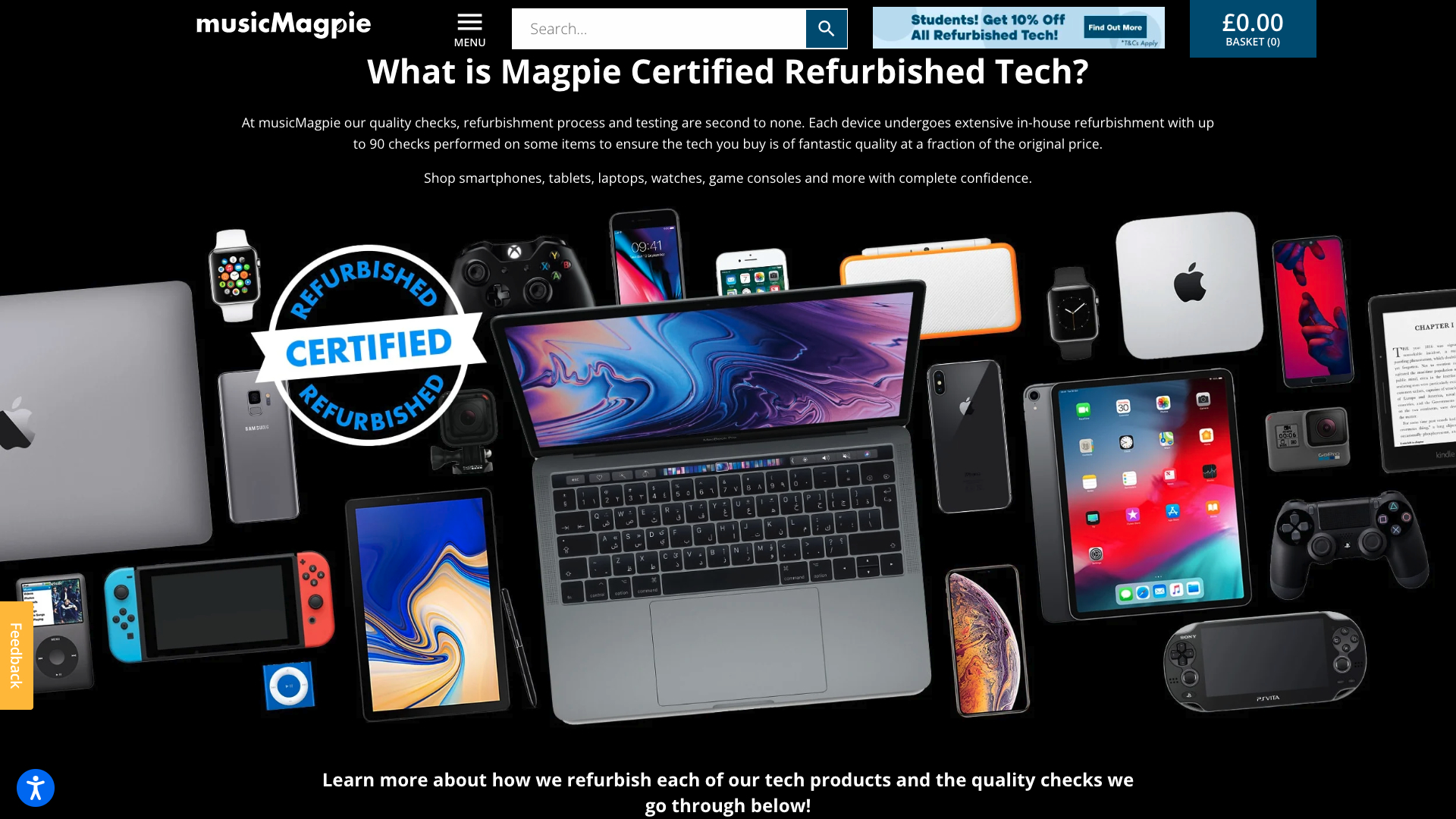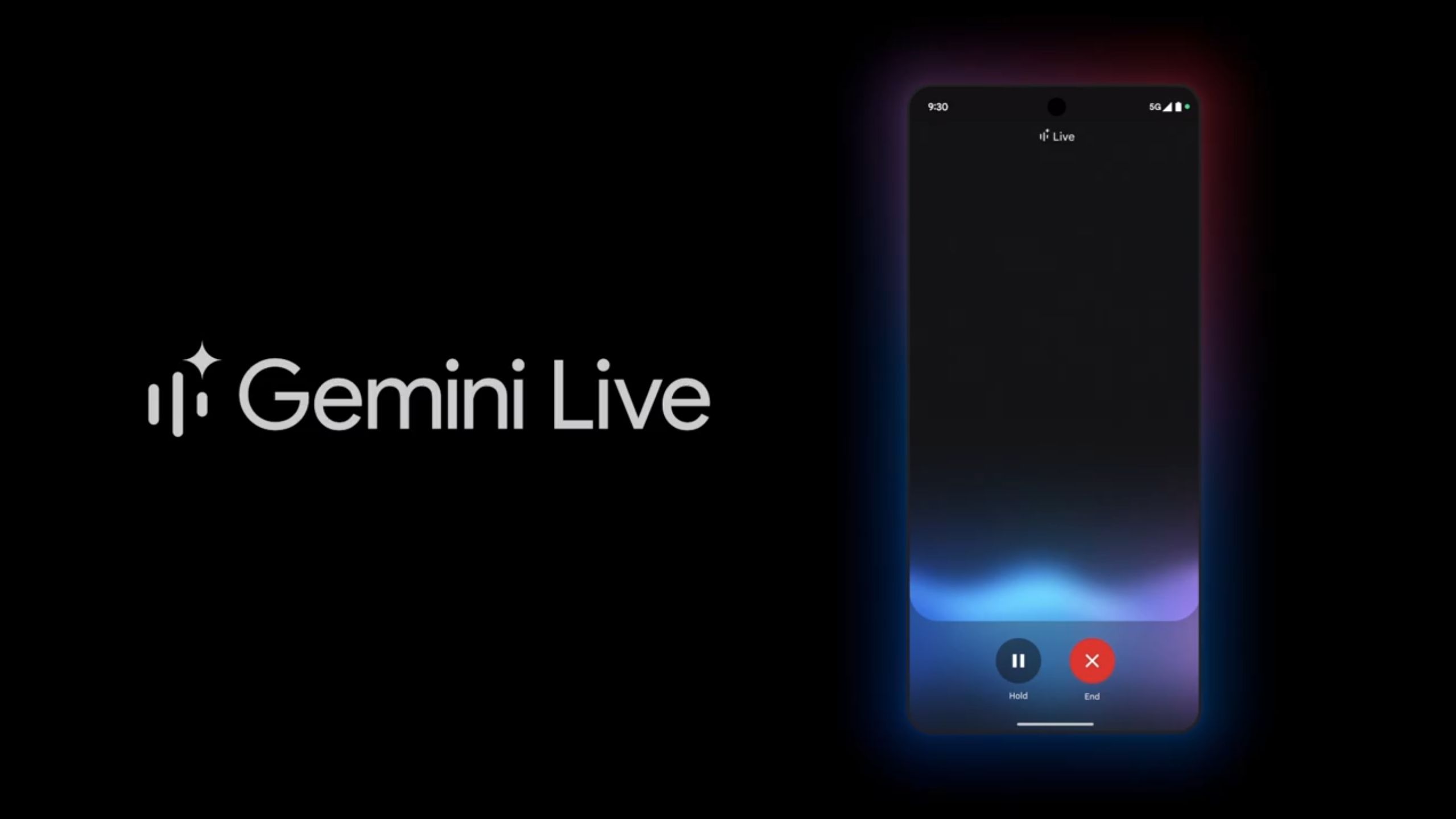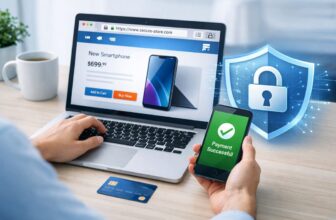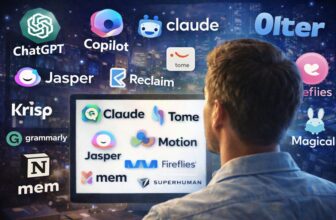
Let’s face it: Kids want iPhones. Their favorite celebrities use them, their parents use them, and some of their friends have them, too. But which iPhone is best for your kid? There are lots of factors to consider, not the least of which is the age of the child in question. When should a child be given their own iPhone? We’ll discuss that in a section below.
For toddlers who need a simple device for watching parent-approved videos and playing some games or educational apps, we recommend avoiding iPhones altogether and getting a basic iPad. It’s affordable, you don’t have to worry about cellular connectivity, and the large size is easy for toddlers still working on their fine motor skills. You can check out our best iPad for kids guide to see if this would be a better fit for your child, and we recommend a look at our best iPad deals roundup so you can get the best prices.
But, once a child gets old enough for phone connectivity to be useful (for mobile internet, texting friends, tracking and being contactable by you), it’s time to step up to a proper iPhone. Apple has just updated the iPhone for 2024, introducing the iPhone 16 series and reducing the prices of the current handsets. How does that change the landscape for the best iPhone for kids? Read on to find out and see our recommendations.
Whatever iPhone you get, you should consider using Screen Time to manage their use. Built into iOS, Screen Time lets you set limits on how long your kid can use their phone, what apps they can download and use, and when they need to put it down for the night. It’s a great way for busy parents to keep tabs on what their kids are doing when they’re not within eyeshot, and ought to be the first thing you set up.
Best iPhone for kids
Below you will find our top choices for iPhones for children. We aren’t recommending the ultimate iPhones because we think that unless you have a money tree in the garden you won’t want to be spending a whole lot of money on a phone for a child who is just as likely to leave it on a bus or drop it. But if you’d like a wider range of iPhones to choose from read our iPhone buying guide and our iPhone comparison.
Apple iPhone 14: Best iPhone for older kids
Pros
- Price
- Display size
- Good battery life
- Decent camera
Price When Reviewed:
£599 (was £699)
Older kids (young teens and high school students) have demanding standards. An iPhone SE may serve them well, but that smaller screen is a little archaic and they’re going to want to look cool in front of their friends. More importantly, photo-taking and social media have started to become an important part of their social life. So if you’re willing to spend more on an iPhone with a more capable camera, Face ID, and a full-screen display, we recommend looking no further than the iPhone 14.
With a 6.1-inch display, it’s considerably bigger than the iPhone SE, which older kids will appreciate, and it has a more modern design and features. The iPhone 14 will deliver, with battery life that will easily last a full day.
You might be wondering why we picked the iPhone 14 over the iPhones 15 and 16. It’s cheaper, which is a good enough reason. But we also think that the iPhone 14 compares very favorably with the iPhone 15. Sure, you’re giving up some of the newer features, such as improvements to the camera, or the iPhone 15’s USB-C port instead of Lightning. The iPhone 14 still has a faster chips and excellent battery life.
The iPhone 14 starts at $599/£599 for 128GB, you pay another $100/£100 for the iPhone 15 and yet another $100/£100 for the iPhone 16. Since your 9th grader is probably going to fill up the memory quickly making TikTok videos and taking selfies and pics for social media and texting with friends, we’d suggest that if you do have a bigger budget that the extra money is spent on increasing the storage in the iPhone 14 rather than the bells and whistles of the newer models.
Read our full
Apple iPhone 14 review
Apple iPhone SE (2022): Best iPhone for younger kids
Pros
- Price
- Small size
- Durability
Cons
- No Face ID
- Older, less modern, design
Price When Reviewed:
$429 (64GB) | $479 (128GB) | $579 (256GB)
If you have a kid at grade school/elementary/primary school who’s mature enough to handle their own phone, you should look no further than the iPhone SE. It’s got the same A15 processor used in the iPhone 13 range, so you know it’s going to perform well and get software updates for years. With a 4.7-inch screen, it’s also pretty small, which is good for younger kids’ hands and pockets. It’s a more than serviceable iPhone, and there’s really nothing your kid may want to do that they won’t be able to, outside of using features like Memoji or Animoji, which require the TrueDepth camera found in the Face ID-equipped higher-end iPhones.
The best part is that it’s inexpensive (for an iPhone) at $429/£449, although that is for the 64GB version, which could fill up quickly if the child in question wants to download plenty of games and content to watch. Stepping up to the 128GB version ($479/£499) can alleviate this, but the price does start to creep up. Still, cutting back on features like the all-screen Liquid Retina display and dual cameras, and sporting Touch ID instead of Face ID saves a lot of cost, so the SE will still be cheaper than all the other iPhones. And since young kids tend to be rough on stuff, even with a good case and screen protector (which are highly recommended), you’re not going to want to risk putting a $700 phone in their hands.
In truth, we don’t really recommend the iPhone SE (2022) for adults (although it can be ideal for the elderly), as in modern terms it seems a bit dated and limited, but for a kid’s first step into the Apple world it would be a great choice.
Read our full
Apple iPhone SE (2022) review
Apple iPhone 16 (128GB): For kids who want everything
Pros
- Latest iPhone
- Huge improvement in battery life
- Supports macro and spatial photography and video recording
Price When Reviewed:
$799
There is of course a certain status that you can only get from having the latest iPhone, and kids certainly aren’t immune to that. There are a lot more reasons to buy the iPhone 16 than there were for the iPhone 15 in 2023, including the new Camera Control button and an improved camera that’s capable of taking macro and spatial photos. That might be handy if your child is often working on projects and wants to expand their artistic eye for the pictures they take.
Perhaps the biggest change for 2024 though, is the huge improvement in battery life. In our tests, we saw a four-hour boost in battery life for the iPhone 16 over the iPhone 15. That’s a drastic improvement. Kids are never aware of the amount of battery their phone uses, so the iPhone 16’s battery life gives them even less to think about.
We also recommend getting a case, see Best iPhone 16 cases.
Read our full
Apple iPhone 16 review
iPhone 15: Best iPhone for kids who want higher-quality photos and video
Pros
- 48MP sensor in the camera
Cons
- iPhone 16 offers much better battery life
Price When Reviewed:
From $699 (Was $799)
While the iPhone 16 is a better overall phone, the iPhone 15 is no slouch. It has a better camera than the iPhone 14, shooting at higher resolution to provide better quality. It also records excellent video that kids can use in presentations or social media.
The main drawback to the iPhone 15 is its battery life–it’s actually very good but the iPhone 16 offers a dramatic improvement. But otherwise, the iPhone 15 is a top performer and can handle anything you child wants to do on it, including streaming videos, games, and a lot more.
Read our full
Apple iPhone 15 review
iPhone 13 mini – Best value iPhone for kids
Pros
- Fantastic size
- Lightweight
- Great cameras
Cons
- Discontinued by Apple so harder to find
- Battery life isn’t amazing
Price When Reviewed:
Was $599
Apple has discontinued the iPhone 13 mini, but if you can get hold of one it is an excellent choice for youngsters with a small frame that is perfect for small hands.
The device shares most of the attributes of its bigger brother the iPhone 13, including the processor and twin rear cameras. Somehow the engineers at Apple still managed to fit a 5.4-inch display into a device that’s smaller than the iPhone SE.
One thing to bear in mind is that the smaller nature of the mini means that battery life can be a little lacking. So, if you’re expecting your kid to be on it all the time, especially when out and about, we’d suggest maybe picking up a portable power bank to top up the battery if things get low. As the iPhone 13 mini supports MagSage, you can choose one from our roundup of the best MagSafe portable battery packs and power banks.
Read our full
Apple iPhone 13 mini review
Buy a refurbished iPhone
Before you buy one of the phones mentioned above our advice is to explore the second-hand and refurbished market. Buying a second-hand or refurbished iPhone can save you a lot of money.
Your first port of call should be Apple’s Refurbished store where Apple sells iPhones that have either been returned as faulty or unwanted. These iPhones (and other products) are fixed up so they are good as new and sold at around 15% off their normal price.
There are various benefits to buying from Apple’s Refurbished Store in the U.S. or U.K., including the fact that all products in the Refurbished Store come with a one-year warranty.
You may even be able to find an older iPhone model that Apple doesn’t sell anymore, such as the iPhone 12 mini or an iPhone 13 Pro in Apple’s refurbished store.
But Apple’s not the only place that sells refurbished iPhones though; there are plenty of companies that make a living from refurbishing and selling iPhones. Check out our where to buy second-hand and refurbished iPhones guide for more details.
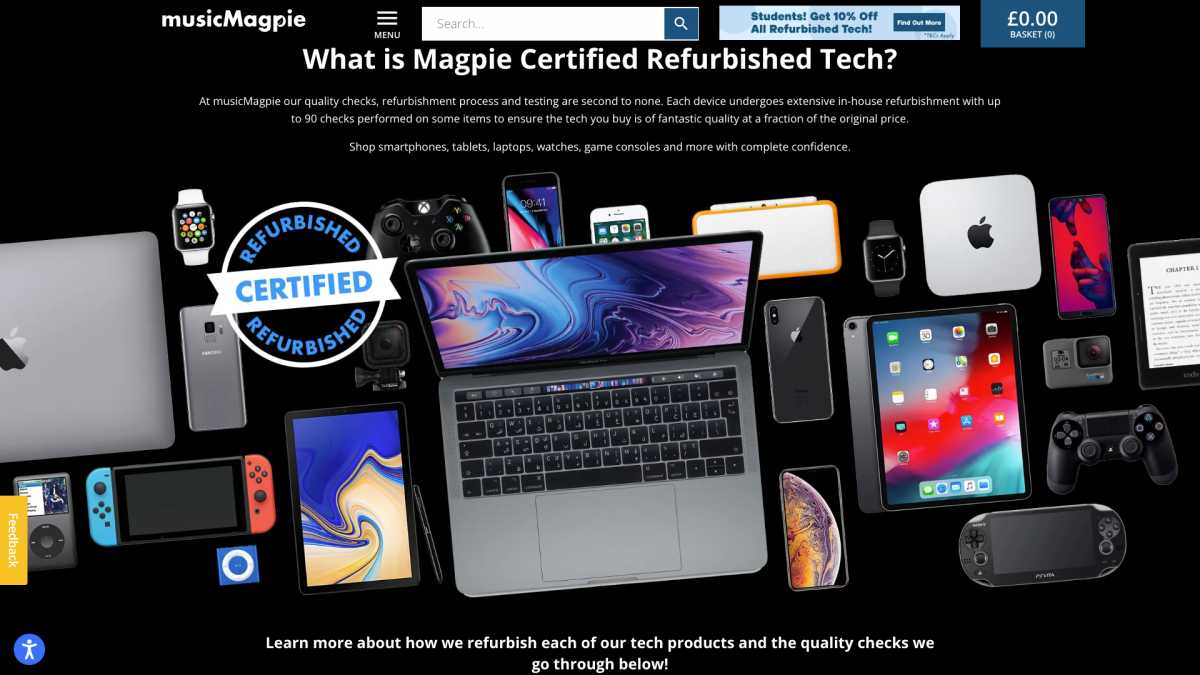
musicMagpie
There is a growing marketplace for older devices that are fixed up and sold on. Before you buy from one of these do check their policies regarding refurbishment and returns, and also we’d advise buying recent models of iPhones – some of these outlets have much older models. Consult How long does Apple support iPhones for more information about the handsets to avoid.
Refurbished iPhone sellers in the U.S.
- Decluttr: A popular destination for refurbished devices, often with sales that slash even more money off. You can also trade in any of your old tech, gadgets, and media (including books and CDs) to get steeper discounts.
- The iOutlet on eBay: Offers competitive pricing for refurbished devices and also accepts other gadgets such as iPads, Apple Watches, and gaming consoles.
- Amazon Renewed Store: This site’s greatest benefit is that purchases are all backed by Amazon’s standard returns policy and its “Renewed Guarantee” lets you get a refund or replacement within 1 year of receiving your product.
- Best Buy: Best Buy doesn’t offer a great deal of information on pre-owned iPhones’ condition, but you can return within 14 days if the item is “unopened or defective in any way.”
- Walmart: Walmart doesn’t sell refurbished iPhones directly; rather, they are sourced from other sellers. Return policies vary from seller to seller, but there are minimum requirements that apply universally.
Refurbished iPhone sellers in the U.K.
- Music Magpie: The UK version of Decluttr and a good place to start looking for refurbished iPhones. You may find that sales reduce the price still further.
- The iOutlet or The iOutlet on eBay: Offers competitive pricing for refurbished devices and also accepts other gadgets such as iPads, Apple Watches, and gaming consoles.
- Amazon Renewed Store: While you can’t really sell on Amazon Renewed unless you’re a business, those looking to buy a refurbished iPhone Amazon Renewed have plenty of options to choose from. Its greatest benefit is that purchases are all backed by Amazon’s standard returns policy and its “Renewed Guarantee” lets you get a refund or replacement within 1 year of receiving your product.
- Envirofone: Also allows you to trade in your old phone for cash towards purchasing a refurbished phone. However, it mostly specializes in phones so you won’t be able to trade in your DVDs or books for cash.
- 4Gadgets: Offers a 12-month warranty for all online orders.
- Reboxed: Pledges that devices “are fully tested and in perfect working order.” All come with a 12-month no quibble warranty.
- Smartfone Store: Look out for the additional 10 percent discount for students and young people.
- Refurb-Phone: Like most refurb sellers, this site offers a 12-month warranty. Less commonplace is its policy of allowing returns within 14 days if you simply change your mind.
- The Big Phone Store: Says it ensures refurb phones “are thoroughly tested, repaired, and cleaned before being sent out.” Backs this with a 12-month warranty.
- Laptops Direct: You get a 12-month warranty on parts and labor. Watch out for slightly confusing grading system: “A3,” for example, means “Average condition.”
- Back Market: You get 30 days to change your mind and a 12-month warranty… or occasionally more.
Companies like musicMagpie (UK), Decluttr (US), Amazon and eBay are all now providing this service, along with one-year warranties and money-back guarantees if you’re not completely satisfied with your purchase. Of course, investing in older tech is also better for the environment, as it stops the iPhones from being thrown into landfills even though they are capable of providing years more service to a happy kid.
So, they come with guarantees, save you money, and protect the planet. What’s not to love?
Pass on an old iPhone to them
Another route to explore is handing over your current iPhone and buying yourself a new one! If you’ve had yours for a while, then it may be out of its contract period, but if you bought it outright then all you need to do is get a new SIM card for your youngster, give them your handset, then head off to the Apple store to give yourself a present for being such a magnanimous parent. If you’re unsure what to treat yourself to, our best iPhone roundup should prove a helpful guide.
Before you hand over your old iPhone make sure you set it up correctly for your child. Have a look at 5 things to do before giving an old iPhone or iPad to your kid, how to prepare an iPhone for sale, how to reset an iPhone and how to set up parental controls on iPad & iPhone.
Should kids have iPhones?
This is a huge question and a topic fraught with pros and cons. Everyone is different. There are still parents who don’t allow their kids to watch TV, let alone play computer games. Other parents don’t see any harm in letting their kids be familiar with technology. And others just need a few minutes of peace while they push a toddler around a supermarket, or something to stop the tweens fighting in the back of the car on a long journey. Surely allowing the kids a few minutes here and there with a mobile phone won’t damage their development.
You could give them your own iPhone of course, but that depends on how prepared you are for the risk of them sending their favorite YouTube video to your manager at work. A better solution may be to give them an old iPhone or iPad: it can still be linked to your account so there is no need to pay for the apps you’ve already downloaded for them.
Older kids will no doubt want a handset with a bit of credibility. It’s also at this age that the risks associated with mobile phone ownership become more prominent as concerns about their use of, and influence of, social media become apparent. You will want to familiarise yourself with Parental Controls and ensure that they are really mature enough to handle all that comes with this connection with the world and that they are able to avoid becoming addicted to their handsets.
Apple founder Steve Jobs famously limited his kid’s use of technology, so maybe we should take a leaf out of his book. Or maybe we should accept that our kids are growing up in a world so immersed in technology that it is going to be a part of their lives whether we like it or not. We just need to control their access to it, rather than stop it altogether.

